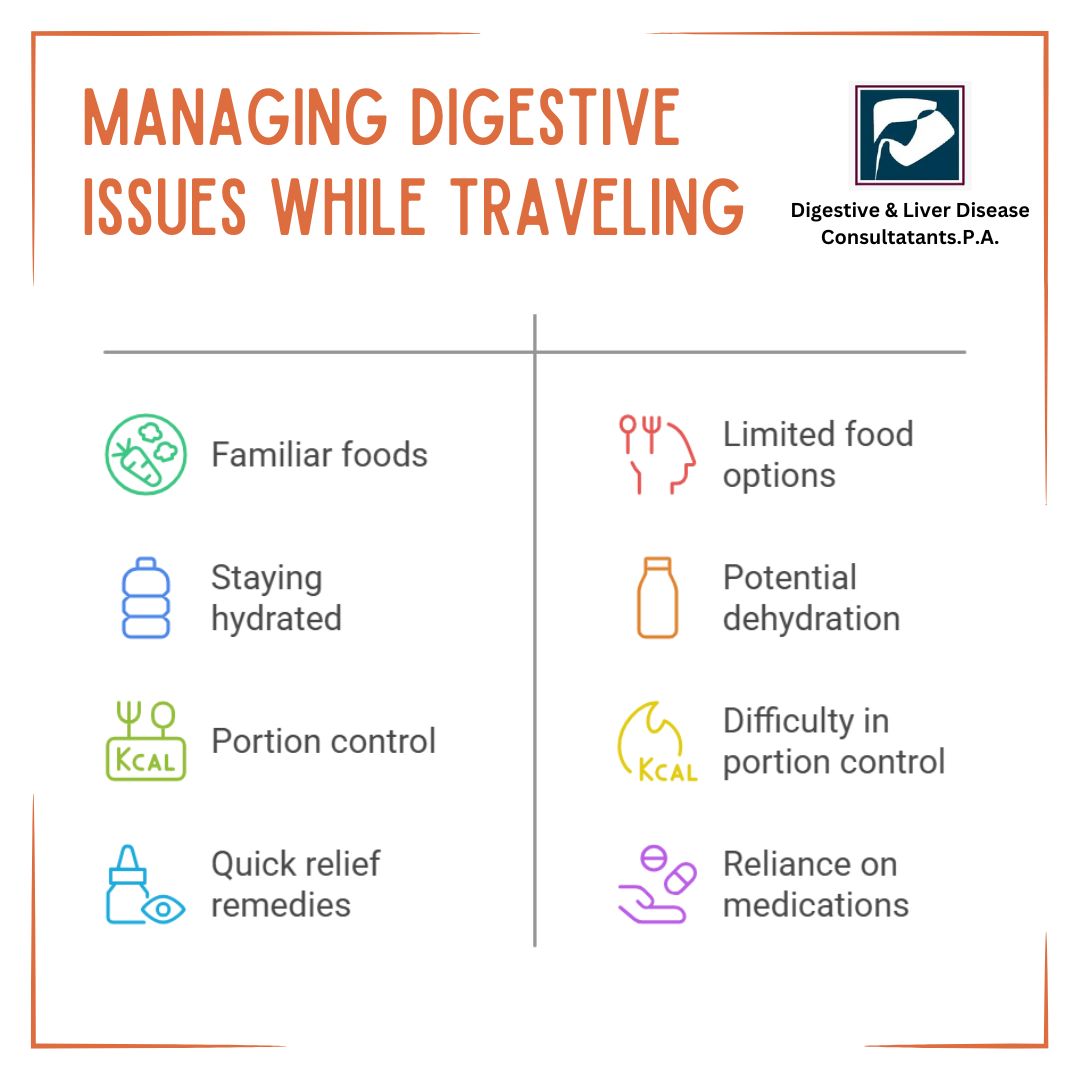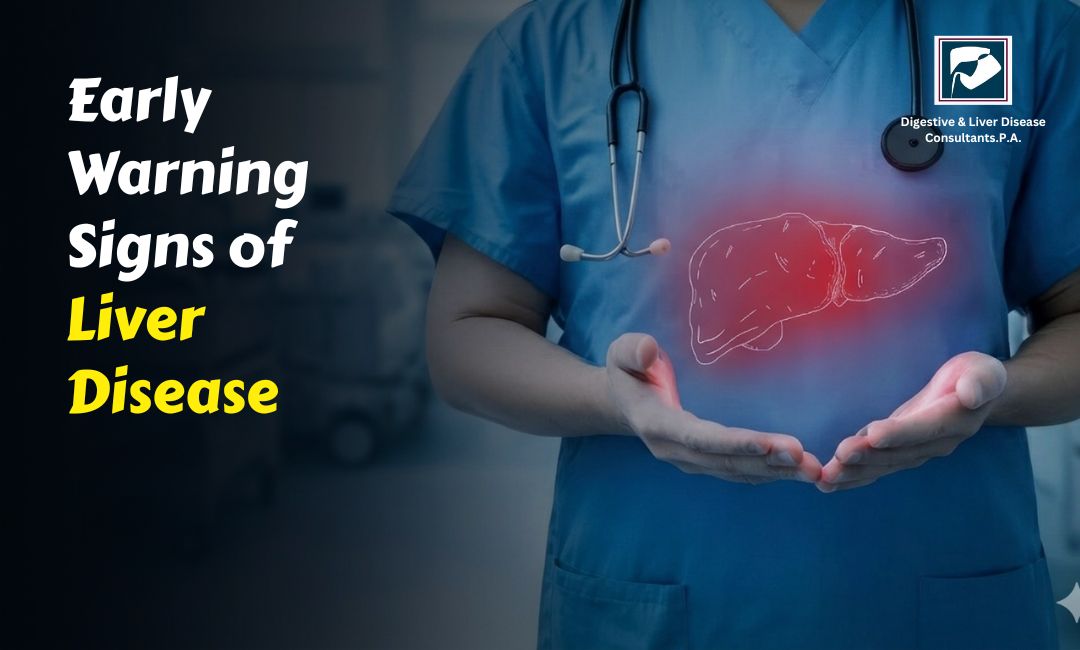Traveling can be one of life’s greatest pleasures, offering the opportunity to explore new places, meet different people, and experience diverse cultures. However, for many, the excitement of travel is often marred by digestive issues, whether it’s an upset stomach, constipation, or other gastrointestinal discomfort. If you’re someone who struggles with digestive problems while on the go, you’re not alone. Fortunately, there are ways to manage these issues and enjoy your travels without letting them ruin your trip.
At Digestive & Liver Disease Consultants, P.A., we understand the impact that digestive health can have on your quality of life, including when you’re away from home. In this blog, we’ll explore practical tips for handling digestive issues while traveling and how to make the most of your trip without sacrificing your health.
Why Digestive Issues Can Be Common While Traveling
When traveling, your routine changes. Different foods, environments, and time zones can all contribute to digestive problems. Common issues travelers face include:
Bloating: Unfamiliar foods, changes in meal timing, or dehydration can lead to bloating.
Constipation: Traveling often disrupts your regular eating habits and physical activity, leading to constipation.
Traveler’s Diarrhea: Eating contaminated food or drinking unclean water can cause digestive upset.
Acid Reflux or Heartburn: Changes in diet, stress, or eating late can trigger acid reflux, leading to heartburn or indigestion.
These digestive issues are not only uncomfortable but can also interfere with your travel plans. Fortunately, with some preparation and awareness, you can avoid or minimize these concerns.

Tips for Preventing and Managing Digestive Issues While Traveling
Stick to a Balanced Diet
When you travel, it’s tempting to indulge in local delicacies and treat yourself to foods you might not normally eat. While it’s great to explore new flavors, it’s important to maintain a balanced diet that supports digestive health. Eating a variety of fruits, vegetables, whole grains, and lean proteins can help keep your digestive system on track.
Avoid overeating: Large meals can put unnecessary stress on your digestive system, leading to indigestion or bloating.
Stay hydrated: Drink plenty of water to prevent dehydration, which can lead to constipation and digestive discomfort.
Be Mindful of Food Hygiene
Traveler’s diarrhea is a common concern, especially when visiting countries with different standards of food hygiene. To reduce the risk of foodborne illnesses:
Drink bottled or filtered water: Avoid tap water, and don’t use ice made from tap water.
Eat freshly prepared food: Avoid street food or dishes that may have been sitting out for extended periods.
Wash your hands regularly: Always wash your hands before eating, especially in countries where sanitation practices may be different from what you’re used to.
Stick to Familiar Foods
If you have a sensitive stomach or are prone to digestive issues, it might be wise to stick to foods that are familiar to you, especially early on in your trip. Gradually introduce new foods as your digestive system adjusts to the change in environment.
Bring snacks from home: If you know certain foods trigger your digestive problems, bring your own snacks (like nuts, protein bars, or crackers) to avoid any surprises.
Avoid heavy or greasy meals: Foods that are rich in fat, overly spicy, or fried can trigger digestive discomfort, so it’s best to keep these to a minimum.
Maintain Regular Meals
When you’re on the go, it can be easy to skip meals or eat at irregular times. However, keeping a consistent eating schedule is key to maintaining healthy digestion.
Don’t skip meals: Skipping meals can slow down your metabolism and lead to indigestion or discomfort when you finally eat.
Eat smaller, more frequent meals: Instead of large meals, try eating smaller portions throughout the day to prevent bloating or overloading your digestive system.
Stay Active
Physical activity plays a crucial role in digestion by helping move food through the digestive system. If you’re traveling and sitting for long periods, whether on a plane, bus, or train, try to get up and move around every couple of hours.
Walk around: If you're on a long flight or road trip, take short walks or stretch to keep things moving.
Exercise regularly: If possible, take advantage of your hotel’s gym or go for a walk or jog in the area. This can help prevent constipation and improve your overall digestion.
Use Probiotics and Supplements
If you have digestive sensitivities, taking probiotics or digestive enzymes can help maintain a healthy gut while traveling. Probiotics are beneficial bacteria that support a healthy microbiome, which is essential for proper digestion.
Take probiotics: These can help prevent digestive issues like bloating, gas, and diarrhea. Consider taking a daily probiotic supplement or eating probiotic-rich foods like yogurt, kefir, or fermented vegetables.
Digestive enzymes: These can help break down food more effectively, especially if you’re eating richer or heavier foods while traveling.
Dealing with Stress
Traveling can sometimes be stressful, and stress is known to have a direct impact on digestive health. Whether it’s navigating unfamiliar places, dealing with delays, or worrying about making it to your next destination, stress can cause indigestion, stomach cramps, or even exacerbating conditions like irritable bowel syndrome (IBS).
Practice relaxation techniques: Deep breathing, meditation, or yoga can help reduce stress and improve digestion.
Get adequate rest: Lack of sleep can worsen digestive problems. Make sure you’re getting enough rest to recharge your body and support your digestive system.
Know When to Seek Help
If you experience persistent digestive problems while traveling, such as severe diarrhea, vomiting, or stomach cramps, it’s important to seek medical attention. These could be signs of a more serious issue, such as a gastrointestinal infection or food poisoning.
How Digestive & Liver Disease Consultants, P.A. Can Help
At Digestive & Liver Disease Consultants, P.A., we are dedicated to helping individuals manage and improve their digestive health. Whether you’re dealing with chronic conditions like irritable bowel syndrome (IBS), acid reflux, or liver diseases, our team of experts can provide you with personalized treatment plans to keep your digestive system in top shape.
Conclusion
While digestive issues can be a challenge when traveling, they don’t have to stop you from enjoying your trip. By being mindful of what you eat, staying hydrated, maintaining your routine, and practicing stress-relieving techniques, you can keep your digestive system happy while on the go.
If you’re experiencing ongoing digestive issues, consult with our team at Digestive & Liver Disease Consultants, P.A., today. We offer comprehensive care to help you manage your digestive health and lead a more comfortable life, both at home and while traveling.











